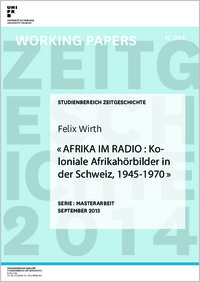Afrika im Radio : Koloniale Afrikahörbilder in der Schweiz, 1945-1970
- Wirth, Felix Université de Fribourg
-
2013
1 e-Book
Radio- und Fernsehgesellschaft der deutschen und der rätoromanischen Schweiz (Suisse)
Radiodiffusion
Représentations sociales
Colonialisme (idée politique)
Décolonisation
1945-1970
Suisse alémanique
Afrique - image
Postcolonialism
History of Swiss radio
Sound History
History 1945-1970
Postkolonialismus
Schweizer Rundfunkgeschichte
Sound History
Geschichte 1945-1970
English
German
Although most Europeans of the 20th Century had never been to Africa, they have a certain idea of this continent, its landscape and its people. Books, films, newspapers and other forms of coverage – mostly made by male, white Europeans – provided a breeding ground for figurative perceptions of Africa (in German-speaking countries so- called «Afrikabilder»). The western audience experienced the «dark» continent not only through visual stimuli. Hearing also plays an important role in the elaboration of Africa-imaginations. The thereby produced sonic forms of representation (so-called «Afrikahörbilder») are the focus of this MA thesis. A total of 14 radio programs serve as the objects of research. They were produced between 1945 and 1970 by various Swiss actors. The programs have in common that they represent Africa in in one way or another. The aim of the study is to examine the colonial character of the broadcasts and its acoustic representations. Based on postcolonial approaches the thesis will show that Switzerland – a country without formal colonies – was part of the transnational European colonialism. Furthermore, the study attempts to establish a new approach in dealing with acoustic phenomena and audio files – a type of source, which has not received much attention from historians so far.
Wenn wir uns Afrika vorstellen, tauchen vor unserem inneren Auge die verschiedensten Bilder, Themen und Motive auf. Diese Imaginationen sind aber nicht nur visueller Natur – auch Stimmen, Geräusche oder Musik werden beim Gedanken an den afrikanischen Kontinent assoziiert. Die «Afrikahörbilder», die zwischen 1945 und 1970 am Deutschschweizer Radio Beromünster zu hören waren, stehen im Zentrum dieser Masterarbeit. Ziel der Untersuchung ist es einerseits, die inhaltliche Zusammensetzung der Hörbilder offenzulegen und im kolonialen Diskurs zu verorten. Andererseits sollen die auditiven Spezifika der Afrikaimaginationen analysiert werden. Dabei liegt das Augenmerk auf akustischen Elementen wie der Stimme, nonverbalen Ausdrucksformen (beispielsweise Lachen) oder Originaltönen, mit denen «Afrika» hörbar und im Zeichen des Kolonialismus «anders» gemacht wurde.
- Collections
- Faculty
- Faculté des lettres et des sciences humaines
- Department
- Département d'histoire contemporaine
- Language
-
- German
- Classification
- Medieval and modern history
- Series statement
-
- Working Papers Histoire Contemporaine ; 4
- License
-
License undefined
- Identifiers
-
- RERO DOC 256841
- RERO R008242481
- Persistent URL
- https://folia.unifr.ch/unifr/documents/309657
Statistics
Document views: 303
File downloads:
- Texte intégral: 400
